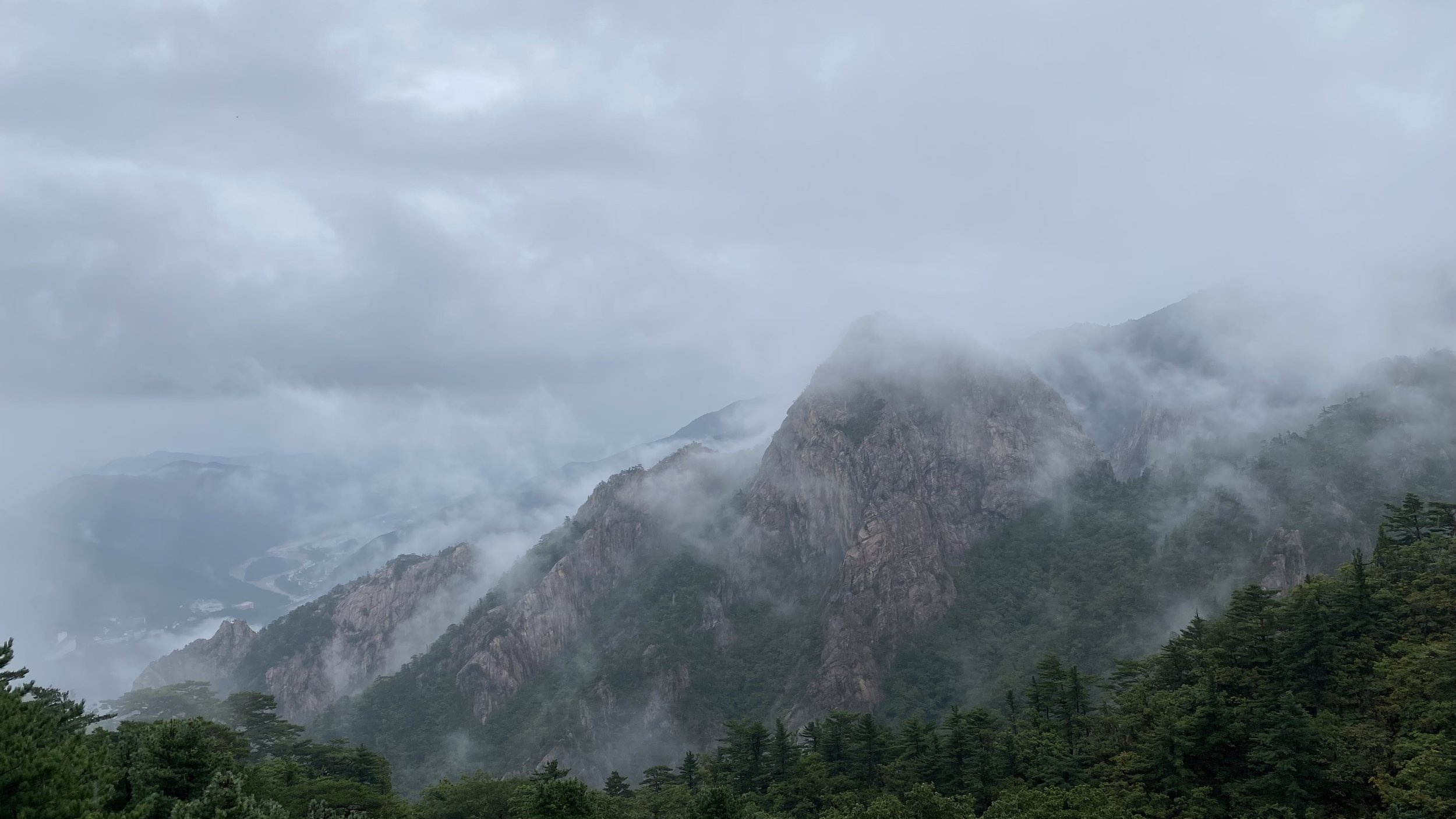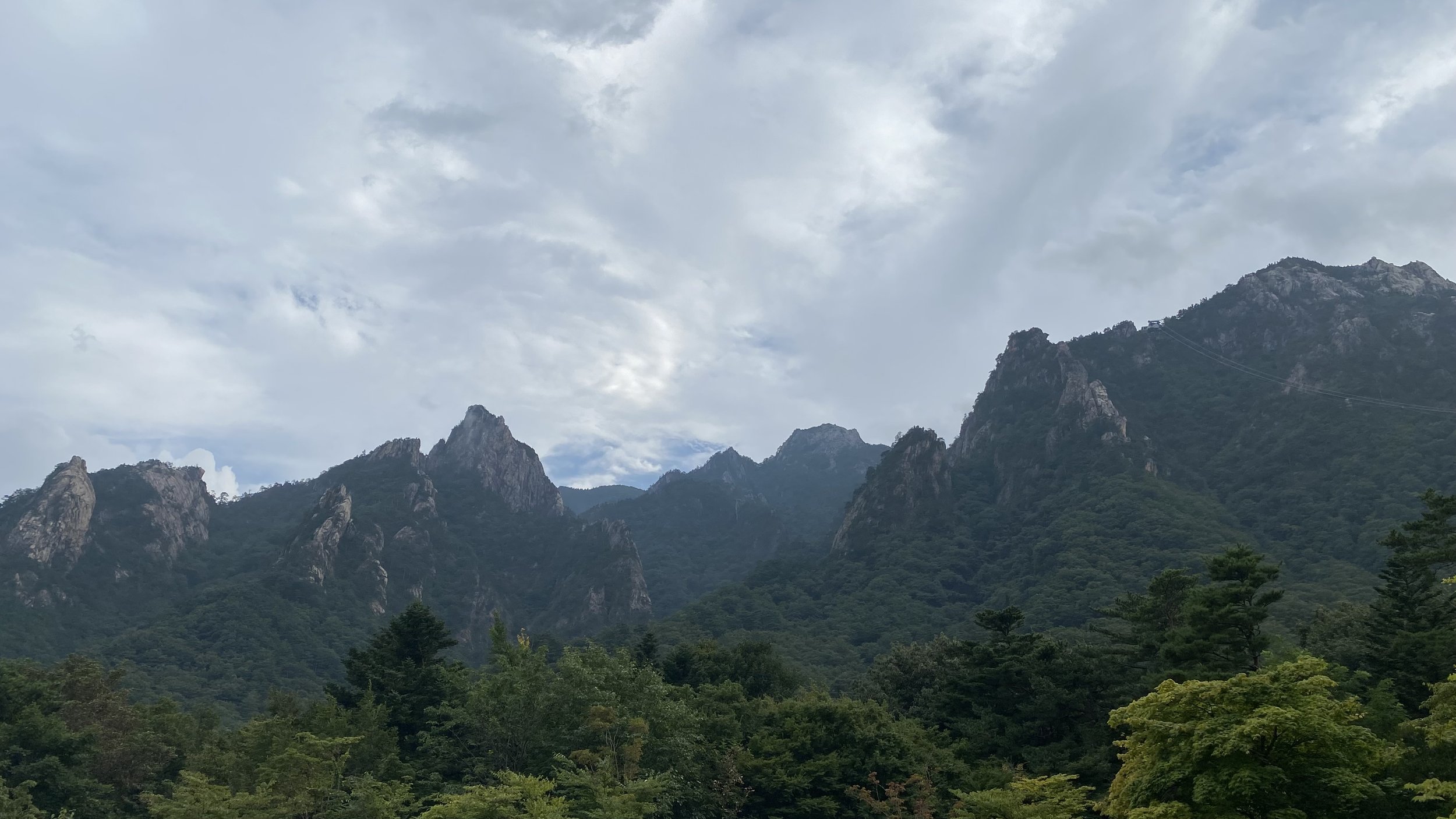THE GRAND HALLA MOUNTAIN
This week, I decided to insert our story of hiking Halla Mountain while on Jeju Island. Even after a few days, some parts of my legs continue to remind me of the grand adventure. I will continue with two more parts of my paper starting next week. As always, thanks for reading!
My wife exclaimed several times, “Look at the sky. Look at the clouds. Look at how the clouds are dancing and moving.” With more vociferous exclamations from me, our exclamations turned into a spontaneous chorus of worship, for several wordless minutes, we were fixated on what was above and what was all around us as we were near the top of the Halla Mountain, the tallest peak (that stands at 1,950 meters) in South Korea. It was as gently as if the blue sky was waving at us, “Come to me and play with me” and the clouds were beckoning, “Come and dance with us.” I thanked God that I had good enough sight to take in the impossibly panoramic sheet filled with colors and movements.
The climb was one of our most grueling hikes ever. I knew I had a second wind in me but did not know there were third and fourth wind in me. All in all, we climbed nearly 5,000 ft covering some 14.5 miles and burning nearly 4,000 calories. We chose Gwaneumsa trail to climb which was steeper but shorter (and more scenic) and then came down on Seongpanak trail which was supposedly more gradual and thus required a slightly longer travel time. But when one is climbing nearly 5,000 ft and descending the same elevation, nothing is gradual or easier! Climbing will test the muscles especially the bottom half of one’s body with endless stairs especially the second half of the ascent and descending will test all one’s jelloed legs and joints especially knees and ankles with trails paved with volcanic rocks of all different sizes and shapes. There are ropes for the most part of the hike. Without it, it would be not only dangerous but also extremely challenging. Even then, I saw a couple of older men who were seemingly floating and gliding around with bare feet. Being in awe, I almost knelt before them. Near the top, I began pulling the rope trying to save my legs. I thought we would save time coming down, but I was wrong, very wrong. By the time we fumbled down the never-ending trail, I did not want to see any more stairs or rocks for days.
We were a group of four including a couple from Singapore who were on the fast track of becoming close friends. Earlier this year in the Philippines, we found out we share the same anniversary date and the year. We visited them in Singapore where they generously hosted us. One dinner they treated opened my eyes wide every single time I put food in my mouth for my taste buds never knew them. My mind wandered to the appreciation and love of the fact that the communions of Jesus were the actual sharing of meals. Not in the spirit of reciprocity, we boasted about Yangpyeong stay and invited them to come to Korea this fall. They came and we were united. Though Yangpyeong experience did not happen since we could not get the same previous accommodation, we bounced around Seoul, Yangpyeong (for a day), Ilsan, and Jeju Island. One of the activities they wanted to do was to climb to the top of Halla Mountain. We had one problem: we were supposed to be at the conference where I was already committed. I wrote to the organizer and asked them if I could miss the opening day. With the favor and understanding, we decided to join in the adventure. During the hike, I did wonder how my body would be the very next morning since I was due to present my paper. . .
Since there were volcanic rocks of all sizes and shapes, we had to pay attention to each step especially as we were descending. With one missed step, one can easily roll an ankle, fall, or even stumble down a slope resulting in serious injury. Rocks with timeless patience say, “Step on me to go where you need to go. I am a rock and am strong.” Rocks also say, “Be sure to pay attention and step on me at a right angle.” Looking down far into the horizon or even a downhill gaze would be an invitation to lose balance and fall. Trees say to us, “Trust us as we are here to nourish you and guide you.” Trees serve as generous escorts to the journey-ers with fresh oxygen and help our lungs expand and sustain our bodies. Wind says to us, “Feel me, feel you, and feel God.” Wind was supple and caressing our bodies, especially our faces reminding us we are alive and that we are part of God’s goodness. Leaves lying dead on the trail bed and the living trees all remind me that death and life coexist, always. Who am I to say that the leaves are dead when they provide life to be living? Who am I to say that the trees and the leaves are living when they too will pass away being food for others? Who am I to say that life is good apart from death? How dare I say that life is good and death is not?
The peak was somewhat anti-climactic since we stood in line for about an hour to take a picture of the stone epithet, legitimizing the climb to the peak. I regretted standing after about thirty minutes into it, but my ego persistently stepped in to persevere. While appreciating the photos, I still regretted it afterward. The weather was ideal for a hike with mostly 40s and 50s with scattered and fast-moving clouds. We packed plenty of water, lots of nuts, bananas, sweet potatoes, carrots, cucumbers, convenience store-bought cheap cheese sticks, chicken breast sausages (which would have been yucky under normal circumstances, but it tasted like a gourmet sausage), and smoked eggs. By the time we were done, we went through every single bottle of water and devoured all the food. We experienced a timely provision of picking up a random walking stick that someone must have dropped in the beginning stage of our ascent. Without it, my wife told me she would not have made the hike. We experienced the Korean hiking culture of hospitality where stranger-hikers shared their fruits and goodies. After the grand experience, with a first hearty meal reminiscing our unforgettable adventure and hot showers, we slept like babies that night still hearing the invitations from the sky, the clouds, the rocks, the leaves, the trees, and the wind. After popping a couple of ibuprofen for prevention against cramping, I must have slept with a face of grand contentment.






















